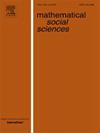论分数分配的可分解性
IF 0.5
4区 经济学
Q4 ECONOMICS
引用次数: 0
摘要
在处理不可分割对象的分配问题时,一种常见的做法是将它们视为无限可分的对象,并指定一种分数分配,然后在可行的整数分配上以抽签的形式来实现。我们要研究的问题是,任意小数分配是否可以分解为任意可行整数分配集合上的抽签。主要结果是对可分解分数分配的描述,它是通过将可分解性问题转化为最大流量问题而得到的。我们还为可分解性提供了一个单独的必要条件。本文章由计算机程序翻译,如有差异,请以英文原文为准。
On the decomposability of fractional allocations
A common practice in dealing with the allocation of indivisible objects is to treat them as infinitely divisible and specify a fractional allocation, which is then implemented as a lottery on integer allocations that are feasible. The question we study is whether an arbitrary fractional allocation can be decomposed as a lottery on an arbitrary set of feasible integer allocations. The main result is a characterization of decomposable fractional allocations, that is obtained by transforming the decomposability problem into a maximum flow problem. We also provide a separate necessary condition for decomposability.
求助全文
通过发布文献求助,成功后即可免费获取论文全文。
去求助
来源期刊

Mathematical Social Sciences
数学-数学跨学科应用
CiteScore
1.30
自引率
0.00%
发文量
55
审稿时长
59 days
期刊介绍:
The international, interdisciplinary journal Mathematical Social Sciences publishes original research articles, survey papers, short notes and book reviews. The journal emphasizes the unity of mathematical modelling in economics, psychology, political sciences, sociology and other social sciences.
Topics of particular interest include the fundamental aspects of choice, information, and preferences (decision science) and of interaction (game theory and economic theory), the measurement of utility, welfare and inequality, the formal theories of justice and implementation, voting rules, cooperative games, fair division, cost allocation, bargaining, matching, social networks, and evolutionary and other dynamics models.
Papers published by the journal are mathematically rigorous but no bounds, from above or from below, limits their technical level. All mathematical techniques may be used. The articles should be self-contained and readable by social scientists trained in mathematics.
 求助内容:
求助内容: 应助结果提醒方式:
应助结果提醒方式:


